New book links missing MP to the Churchill family
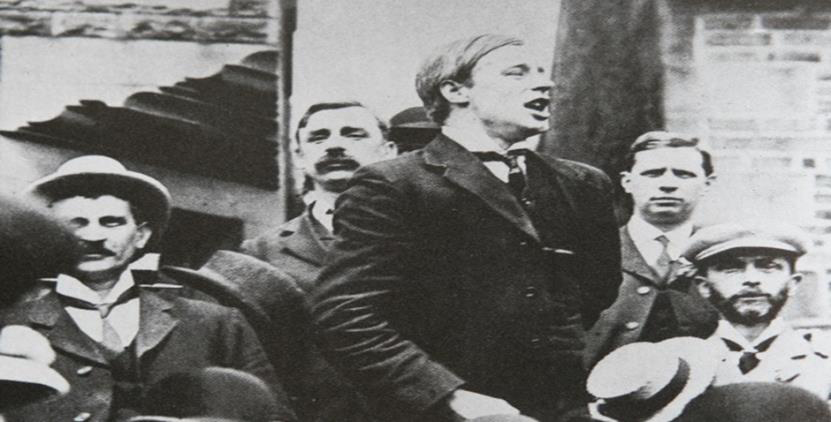 Charismatic speaker Victor Grayson on the hustings
Charismatic speaker Victor Grayson on the hustings
Thu, 16 Jun 2016 11:34:00 BST
Lord David Clark, now a Huddersfield Visiting Professor, launched his book, Victor Grayson: The Man and the Mystery, at a special event held in Heritage Quay
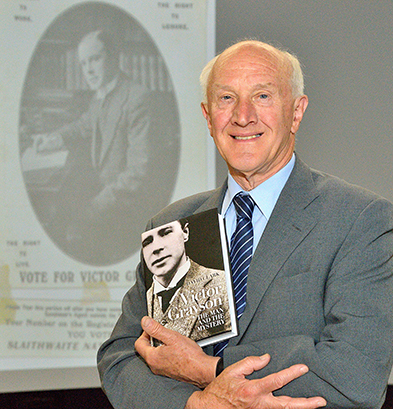 ► Lord Clark with his new book, Victor Grayson: The Man and the Mystery
► Lord Clark with his new book, Victor Grayson: The Man and the Mystery
A TANTALISING link between Winston Churchill and Victor Grayson – the firebrand MP whose disappearance in 1920 is one of the great political riddles of the past century – is explored in a newly-updated book by former Cabinet minister Lord David Clark.
It was given a special preview at the University of Huddersfield, where the author – now a Visiting Professor – is a former politics lecturer. One of his theories is that Grayson could have been an illegitimate offshoot of the aristocratic family to which Churchill belonged.
Lord Clark’s Parliamentary career began in 1970 when he became Labour MP for Colne Valley. This was the seat won in 1907 by Grayson, a powerful orator who stood as a Socialist. There were still first-hand memories of him among David Clark’s older constituents.
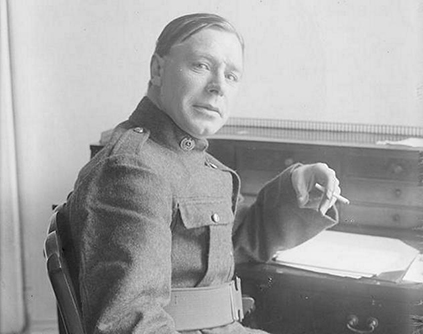 ◄ Victor Grayson in World War One
◄ Victor Grayson in World War One
Grayson had a short, but controversial career as an MP, losing his seat at the 1910 General Election. He served in WWI, but afterwards lived a flamboyant lifestyle in London until, in September 1920, he was observed leaving his flat with two men and was supposedly never seen again.
It is frequently speculated that Grayson was murdered because he threatened to reveal the details of an honours-selling racket that raised huge sums of money for David Lloyd George.
But Lord Clark has developed a theory that in a post-war Britain where the political establishment was terrified of a Russian-style revolution, Grayson had in fact been in the pay of the Government and might have turned to blackmail before being sent overseas with a generous pension, probably dying in the 1940s.
“Grayson was clearly in the pay of somebody. He went from absolute poverty to great affluence,” said Lord Clark, speaking at a University of Huddersfield event that helped to launch the extensively-revised new edition of his book.
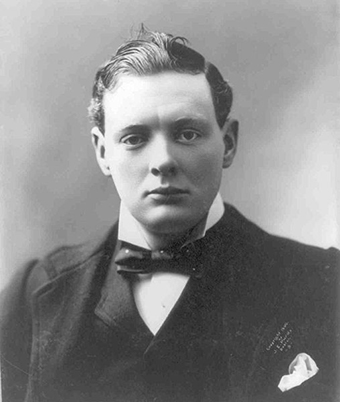 ► Winston Churchill on his US lecture tour (1900)
► Winston Churchill on his US lecture tour (1900)
It is republished by Quartet Books as Victor Grayson: The Man and the Mystery. When it first appeared in 1985 it was titled Victor Grayson: Labour’s Lost Leader and inspired a BBC 2 documentary, screened just once and not seen again until 2014, when it was shown at the University of Huddersfield, with Lord Clark describing his research into a political maverick who continues to exert widespread fascination.
The latest edition of the book includes many recently-discovered photographs of Grayson, plus new material about his political relationship with Suffragette leader Emmeline Pankhurst. Lord Clark has also explored Grayson’s activities in WWI, including visits to Australia and New Zealand to encourage recruitment and a stint as a war correspondent before he joined the forces himself, fighting at Passchendaele in 1917.
During his original phase of research, David Clark was able to speak to Grayson’s daughter, who made the claim that her father had an aristocratic background. “Originally, I dismissed this,” said the author, but recent researches have made him more receptive to the possibility that Victor was the illegitimate offspring of a philandering member of the Churchill family, which is headed by the Duke of Marlborough, whose seat is Blenheim Palace.
For example, Lord Clark discovered that in the wake of the 1915 Dardanelles campaign, in which huge numbers of Anzac troops perished, Grayson wrote a lengthy eulogy to Winston Churchill for an Australian newspaper, at a time when his subject was the most hated man Down Under. In the early 1940s, Winston Churchill – as wartime Prime Minister – ordered the hard-pressed Metropolitan Police to carry out an enquiry into Grayson, who had not been seen for 20 years. The resultant documents were then lost – possibly by Churchill himself, Lord Clark speculates.
Below... Blenheim Palace, home of the Churchill Family
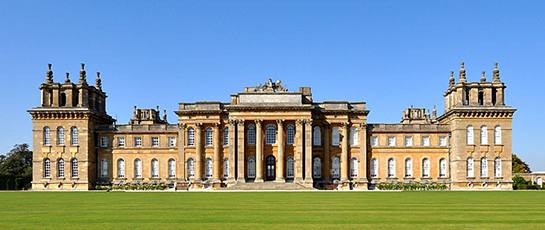
The event that helped launch his new book was held at Heritage Quay, the University of Huddersfield’s award-winning archives centre. It currently has an exhibition titled Radical Roots: Politics in West Yorkshire that includes some of the material that documents Victor Grayson’s political career in the Colne Valley. There are items from many of the collections stored at Heritage Quay, including a considerable amount of material deposited by Lord Clark himself.
He was introduced by the Deputy Vice-Chancellor of the University of Huddersfield, Professor Tim Thornton, who thanked Lord Clark for his generosity towards the University.
“The lurid enigma of Grayson’s later career must not obscure the political and cultural significance of the man in the context of early 20th century politics, especially in this part of West Yorkshire, with its long traditions of radicalism, dissent and independence of thought,” said Professor Thornton. “The archival collections held here at Heritage Quay are bulging with evidence for this.”







